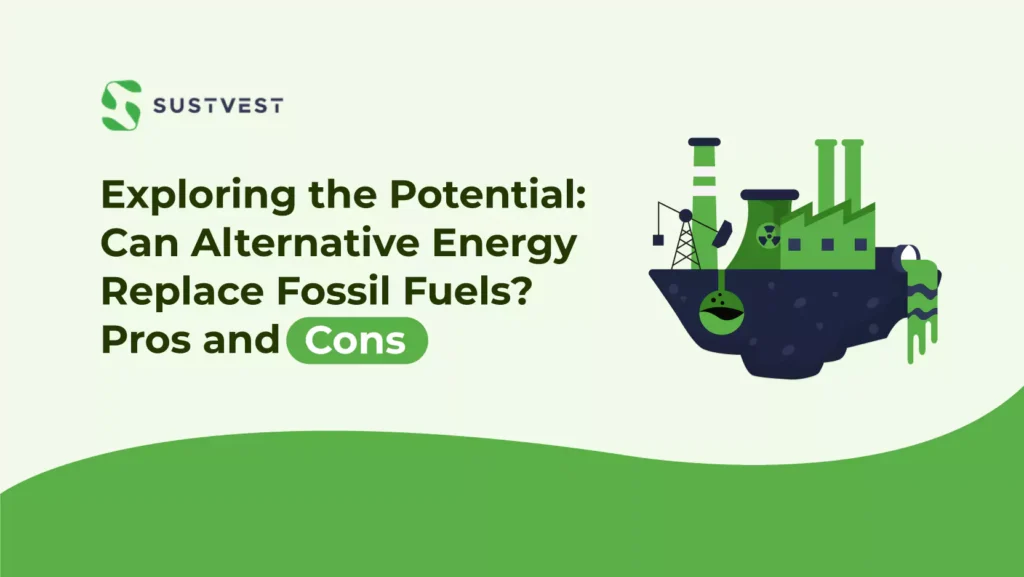
You might believe that renewable energy doesn’t have a significant influence on your daily life. However, consider this: Have you ever enjoyed the company of friends around a campfire? Or utilized a clothesline to dry your clothes? Or simply opened the windows on a pleasant spring day to let the sunlight naturally warm up a room?
Renewable energy is utilized in all of these activities. The wood in the campfire, the wind that dries your clothes, and the sun that warms your home are all examples of renewable energy sources.
The provided examples demonstrate that renewable energy extends beyond the generation of electricity. Natural power sources can be utilized for various purposes, such as heating, cooling, and transportation. By increasing the utilization of renewable energy in these areas, we can decrease our dependence on polluting fossil fuels which harm the climate.
With the examples above you might have guessed that this blog will explore if alternative energy will be able to replace fossil fuel.
But what is fossil fuel? Let’s see.
What is Fossil Fuel?
Fossil energy is naturally present in the earth’s subsoil and has been for several million years. As a result of the accumulation and decomposition of organic matter (mechanization), this non-renewable energy is regenerated on a geological time scale. As it is, given the current level of overconsumption, these resources do not have time to renew themselves and reserves are becoming scarce.
But why will alternative energy replace fossil fuels? Let’s see.
Why Will Alternative Energy Replace Fossil Fuel?
Fossil fuels are the biggest driver behind the climate crisis, and transitioning to a more sustainable system is necessary to fight climate change. Not only this, but it is also necessary if we are to meet the increasing demand for cheap and accessible energy.
This must be done before we run out of fossil fuels or we will face a world that cannot provide energy to all its inhabitants. As it is, over a billion people worldwide lack access to electricity. Perpetuating our collective reliance on fossil fuels will not change this; it will make it worse.
We must ensure renewable energy replaces fossil fuels and carry out a healthier, more accessible long-term plan.
We have mentioned renewal energy so many times, but what does it mean?
What is Renewal Energy?
Fossil fuels like oil and gas are the remains of ancient organisms that died millions of years ago. Because they take so long to form, the earth can’t keep making more to replace what we use for energy. They’re nonrenewable—limited energy sources that will eventually run out.
Renewable energy, by contrast, comes from sources that nature produces continuously. Examples include wind, sunlight, moving water, and growing plants. We can tap into these resources for energy without using them up.
Renewable energy is not the same as clean energy. A wood fire is a renewable way to produce heat, but it also creates air pollution. And other energy sources, such as nuclear power, are clean but not renewable. But most energy sources that are eco-friendly are also renewable, and vice versa.
But is renewal energy better? Let’s see.
Is renewable energy better than fossil fuels?
Renewable energy is certainly more sustainable than fossil fuels, as there is a finite amount of fossil fuels in the earth’s crust. Fossil fuels are made from ancient biological matter that has been contained in a pressurized environment for hundreds of thousands of years.
This is not a process we can recreate quickly. Which means we will run out, and soon. Estimates say we will run through the remaining fossil fuels in between 50 and 150 years.
Renewable energy sources like wind energy, solar power, and geothermal energy rely only on constant and consistent resources. For example, the wind will always blow, the sun will always shine, and the earth will always produce heat.
Once built, wind farms rely solely on the wind to continue blowing to harvest energy. Once installed, solar panels continue to work for decades, creating energy from the sun’s rays.
Fossil fuels on the other hand continue to cause irreparable damage to the ozone layer, and while we can never undo this damage, it is possible to bring this damaging process to a halt.
But why is everyone considering switching to alternative energy or renewable energy? Let’s see.
Benefits Of Renewable Energy
Renewable energy offers a range of benefits including offering a freely available source of energy generation. As the sector grows there has also been a surge in job creation to develop and install the renewable energy solutions of tomorrow. Renewable sources also offer greater energy access in developing nations and can reduce energy bills too.
Of course, one of the largest benefits of renewable energy is that much of it also counts as green and clean energy. This has created a growth in renewable energy, with wind and solar being particularly prevalent.
However, these green benefits are not the sole preserve of renewable energy sources. Nuclear power is also a zero-carbon energy source since it generates or emits very low levels of CO2. Some favour nuclear energy over resources such as solar and wind, since nuclear power is a stable source that is not reliant on weather conditions.
This brings us to the pros and cons of alternative energy.
Pros And Cons Of Alternative Energy Replacing Fossil Fuels
Pros
A healthier, cleaner world to live in.
Currently, those living in urban areas face respiratory issues from sub-par air quality. Alternative energy sources will help improve this significantly. There won’t be oil spills to deal with, we’ll have cleaner water supplies, global warming will lessen dramatically, and so on.
Creates more local jobs.
Clean and alternative energy sources are often produced and used which can help create more jobs, especially in rural areas.
We can future-proof our energy supply.
Whether you believe in global warming or not, there’s no denying that fossil fuels will continue to become more scarce and more expensive. Alternative energy sources can continue to supply electricity when this happens.
Alternative energy will become cheaper for consumers. As fossil fuels become more scarce, their prices will rise. Alternative energy sources will not become scarce – provided we create the infrastructure – and so this will drive energy prices down in the long term.
Reduce dangerous environments for workers.
Those who work in coal, oil, gas, and nuclear power (not a fossil fuel, but worth mentioning) work in dangerous environments. If you look back in history, you can discover numerous occasions where miners have died in tunnel collapses, fires, explosions, and meltdowns. It’s easy to think of these occurrences as a thing of the past, but they still happen regularly where fossil fuels are still abundant.
Cons
Our infrastructure is built for fossil fuels and that means that we need to do a lot of work to change things. Since the Industrial Revolution, we’ve relied on fossil fuels to develop and grow our societies.
Now, we need to change things drastically if we wish to continue living in a healthy world where there is enough energy for all. Businesses will have to change. Change is necessary, but it’s not always easy.
Asking whole industries to move to something different is an extremely difficult thing to do. The businesses that go with the change will survive, but many will resist and therefore die, meaning a loss of jobs, even as alternative jobs are produced.
FAQ: Can Alternative Energy Replace Fossil Fuels
What is the Best Type of Renewable Energy?
There is no ‘best type’ of renewable energy, as use widely depends on location. Iceland, for example, has ample geothermal resources, while places like the highlands of Scotland are well-suited to wind power. In other areas, solar energy is best suited while the United States has invested in hydroelectric power. Each type of renewable energy has benefits and drawbacks, often related to supply, meaning that the best solution is often to use a variety of types of resources together.
Will Renewable Energy Run Out?
Renewable energy sources will not run out – at least not for many millions of years (in the case of the sun, for example). They provide a viable alternative to non-renewable resources, such as fossil fuels while many are also environmentally friendly and produce little or no CO2.
How Effective is Renewable Energy?
The effectiveness of renewable energy depends upon the resource being used. Some renewable sources are more readily available and effective than others, while some, such as geothermal are of great use in some locations and not in others due to accessibility. However, despite these challenges, renewable energy has the potential to reduce electricity sector emissions by around 80%.
Conclusion
Renewable energy sources will likely gain prominence over the next decade, and then more dramatically over time; however, initial investments are required to get these projects off the ground and that can slow down the process.
The decline in international oil prices and natural gas has meant that suppliers are even better equipped to deal with the rise in popularity of alternative energy sources. Ultimately, there is no single renewable energy source that can single-handedly replace fossil fuels.
What’s required is a thoroughly thought-out combination of several sustainable options, each one to be used where appropriate and financially viable.
The transition from fossil fuels to renewable energy sources will not happen overnight, and it will not occur without setbacks and challenges. But the process does need to start now, as it may take four or even five decades to get to a place where it’s making a recognizable impact.
It will entail several costs, not only financially but also from the perspective of changing our habits and ways of thinking. The fundamental point is that a transition to more sustainable options is possible, as long as we begin the process soon.
If you’re ready to make the switch to renewable energy sources to lessen the demand for fossil fuels and encourage the country to invest in the infrastructure to produce more clean energy, then it’s time for you to choose renewable energy.

Founder of Sustvest
Hardik completed his B.Tech from BITS Pilani. Keeping the current global scenario, the growth of renewable energy in mind, and people looking for investment opportunities in mind he founded SustVest ( formerly, Solar Grid X ) in 2018. This venture led him to achieve the ‘Emerging Fintech Talent of the Year in MENA region ‘ in October 2019.




